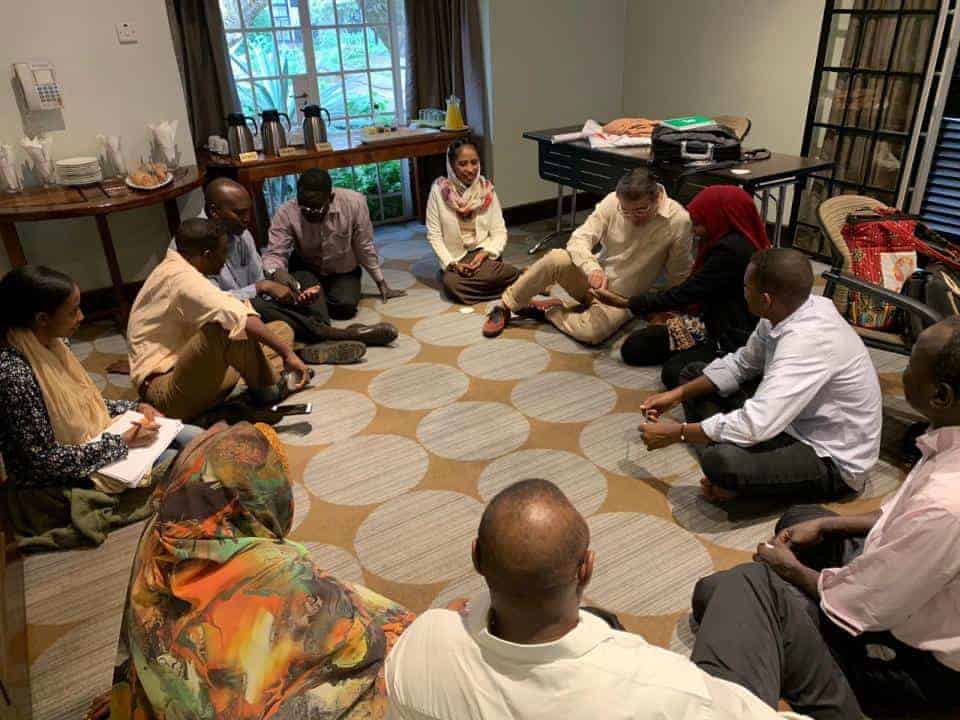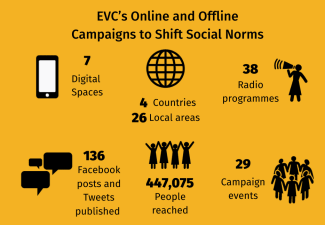How campaigning can shift social norms

For the Every Voice Counts (EVC) programme, CARE Nederland partnered with RNW Media and its training centre RNTC to train and coach their country teams in Burundi, Rwanda, Somalia and Sudan on traditional and digital media campaigning. These campaigns led to early signs of changing attitudes and behaviours at the household and community levels.
Persuasive Storytelling: How campaigning can shift social norms
Through the Every Voice Counts (EVC) programme, which is implemented in 6 countries worldwide, CARE Nederland aims to make sure that these voices will be heard. However, due to restrictive circumstances, amplifying the voices of young people cannot always be done through traditional advocacy and media engagement initiatives. To be able to achieve the programme objectives on youth engagement, a new and different approach was necessary for countries where civic space is shrinking and where traditional media channels are highly restrictive.
RNW Media's focus on youth
This is where RNW media came in. RNW Media focuses on young people who live in fragile or repressive states that are usually going through civil unrest and conflict. These young people often represent the majority of their country’s population, yet they’re ignored and denied crucial information and services. They want to speak freely, have conversations about what matters to them – both personally and politically – and find the information they need to make their own choices about their future.
Piloting partnerships to create change
CARE and RNW media, with RNTC training for CARE country staff on Persuasive Storytelling for Digital Campaigning, piloted partnerships in Burundi, Rwanda, Somalia and Sudan. During the training, CARE staff created an action plan which was part of the campaigns that were implemented in the regions. The campaigns had a specific objective: To promote engagement of young people that leads to positive changes in their attitudes and beliefs, related to influencing formal and informal decision making processes.
Media campaigns for social change
Via media campaigns which focussed on challenging social norms, NGO staff and media partners promoted the rights and needs of marginalised groups. The training participants learned how to integrate their advocacy and to lobby with campaigns that empower young male and female role models and enable them to stand up for their rights. The campaign called to action carried via broadcast and social media aim at calling the government and other authorities to be accountable and support truly inclusive governance.
Tailor-made solutions
The creative approach and media formats were tailored to suit different country contexts. These include digital platforms and traditional ones such as radio. Together with CARE partner offices in Burundi, Rwanda, Somalia and Sudan, RNTC's media training was enabling the voices and views of women, and young people to be heard by decision-makers.
The training and coaching sessions focussed on the technical aspects of media work and connected with the expertise CARE staff and their NGO partners already developed in the fields of Gender Based Violence (GBV) and women's rights. Through participating in events and involvement in integrated campaigns, excluded groups in the focus countries were supported to actively and effectively influence decisions that affect their lives.

Outcomes: Social impact
The target audiences that engaged with the campaigns began showing signs of changing attitudes at the household level. For instance, men in Rwanda and Burundi began sharing household chores (like cooking, cleaning, child-care) and financial decision-making to exercise their commitment to supporting women’s rights and equality. In Sudan, 11 parents allowed their daughters to continue education and many others committed to refrain from marrying their daughters off early.
The campaigns engaged with powerholders to influence community members. In Somalia, dialogue forums brought together successful women and clan elders to discuss women’s political participation, thereby inspiring other young women to participate in governance processes. In Sudan, religious leaders agreed to include the importance of addressing negative social norms in their sermon during Friday prayers. Aligning with Sudan’s campaign, a headmaster of a girls’ school also expressed ardent support against early marriage and committed to organise sessions with parents to discuss the importance of girl’s education.
Additionally, in Burundi, a commune administrator decided to personally lead the offline campaign activities and abolished the fees for marriage registration, which enables more women to register their marriages and be qualified to participate as candidates in the local elections.
Read more about the impact and take-aways of these campaigns here.
[Source: CARE Nederland]